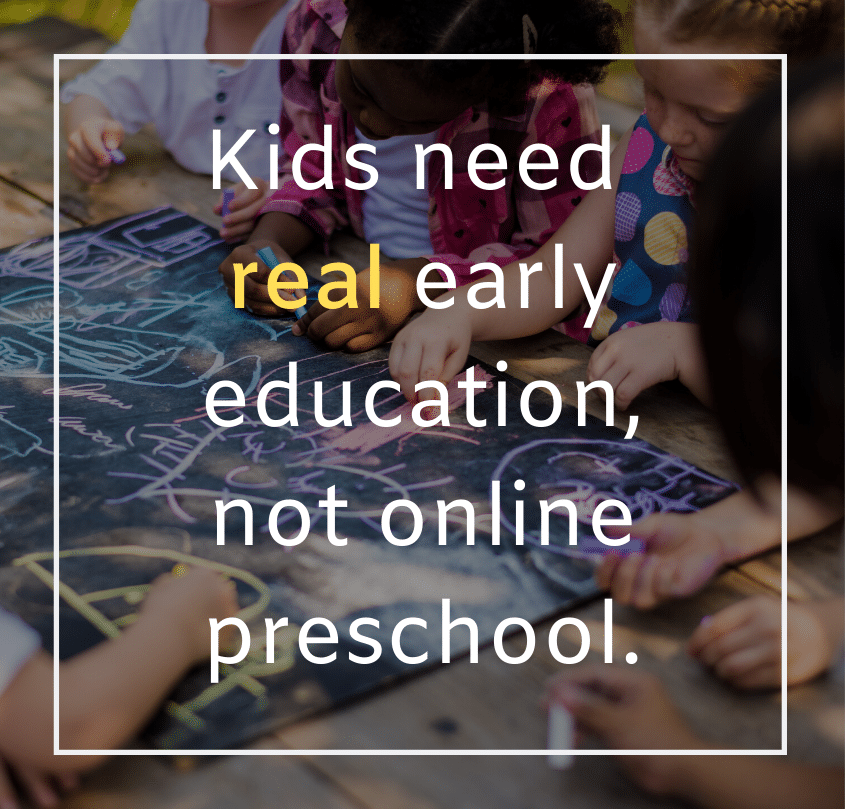Waterford UPSTART, an online preschool program that CCFC and our allies have repeatedly spoken out against, is launching a major expansion thanks to wealthy private donors. As part of The Audacious Project, a TED-backed initiative that connects powerful private funders with “innovative ideas,” UPSTART could raise tens of millions of dollars on the basis that they’re a “proven” program in kindergarten readiness – despite the fact that 75 minutes isolated on a screen can’t possibly provide four-year-olds with the social, emotional, and physical interaction that they need to learn. And just as CCFC and DEY suggested would be the case, UPSTART plans to use public funds to implement their program across the United States.
UPSTART’s talk at TED 2019 focused on how their program “isn’t taking anything away,” and that “it’s for kids who have nothing.” Specifically, they used the term “unserved,” and suggested that UPSTART will reduce inequality in early education. Yet their ultimate goal is to, in fact, take something away: public funding that could be invested in quality face-to-face early education. Waterford’s plan is to take this Audacious Project money, distribute their software to the neediest kids in the U.S., and then lobby state governments to take over funding.

This is exactly the scenario we laid out in our letter, where a “stop-gap” measure effectively derails a movement for real universal pre-K by funneling money that could be used for real preschool programs into a software company’s pockets. And in fact, it’s already happening. Utah already funds UPSTART instead of real-life preschool. And a few weeks ago, North Carolina’s House of Representatives passed a budget bill that included $500,000 for UPSTART’s pilot program, but lacked funding for real, hands-on early education that actually helps kids prepare for kindergarten.
If states adopt UPSTART and its funding model, they’ll only exacerbate inequalities: poor, rural, and other children who have “nothing” will be given impersonal screen-based instruction, while their more resourced peers continue to have access to high-quality, face-to-face early education. UPSTART says their program is just as good as face-to-face preschool when it comes to “kindergarten readiness,” but we urge lawmakers, educators, advocates, and parents to see through the hype. UPSTART cites research showing that when kids arrive at kindergarten without “basic skills,” they have worse outcomes over time. And that’s true! But the “basic skills” kids need to be ready for kindergarten are social-emotional skills: self-regulation, executive functioning, and interpersonal relationships, not recognizing letters and rhymes. Software can’t deliver those outcomes, and it is not appropriate, fair, or equitable to pretend that they can – or to act like not-as-good is good enough for the country’s poorest children.
UPSTART also makes claims about their program’s long-term outcomes, but those claims don’t hold up. They cite two pieces of research: an independent study tracking kids through the end of kindergarten, and Waterford’s own research tracking kids through fourth grade. In child development terms, neither of these studies counts as long-term – and both of them only measure standardized test scores, a deeply inappropriate measure for early childhood learning. In contrast to Waterford’s studies, the best research about high quality early learning spans decades, and shows a huge range of positive prosocial, economic, and academic outcomes 30 to 40 years after the fact!
Of course, as a new program, UPSTART can’t have 40 years of research backing them. But they sure act like they do. In one statement, a Waterford employee said that “it doesn’t make sense” to not offer a thing that they know works, when so many kids are in need. Again, we agree! We should absolutely fund what works. But we don’t know that UPSTART works, and we have plenty of reason to believe it doesn’t. That’s why we’re calling on lawmakers to fund what we know does work: face-to-face early education driven by play and caring relationships. Yes, funding those kinds of programs are more expensive. But we urgently need them – and kids and families deserve them.
High quality, face-to-face early education doesn’t just benefit individual kids and families. It benefits entire communities – parents can work outside the home, and children can socialize with peers and learn from trained educators, both of which have positive ripple effects that can’t be duplicated by putting a kid in front of a screen for 75 minutes a week. And as DEY has pointed out, there are lots of ways to help rural and low-income kids access the kind of high-quality, interaction-based early education so critical to development. We urge both philanthropists and state legislators to explore these options before falling for UPSTART’s sales pitch.
Now that we know UPSTART’s plan – to funnel public funding away from high-quality early ed and into software – we can get ahead of it. Please reach out to your state legislators today and urge them not to fall for the trap of online pre-k, even when it’s disguised as “kindergarten readiness.”